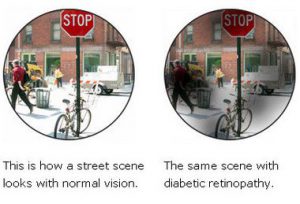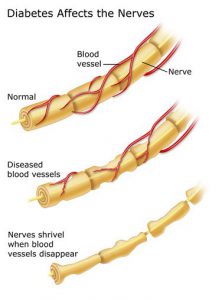Diabetes Mellitus
Diabetes is a disease in which a person has high blood sugar, either because the pancreas does not produce enough insulin or because cells do not respond to the insulin that is produced.
Type 1 and Type 2 Diabetes Comparison
| Type 1 Diabetes | Type 2 Diabetes | |
| Onset | Sudden | Gradual |
| Age at onset | Child | Adult |
| Body type | Thin or normal | Often obese |
There is no known preventive measure against type 1 diabetes, however, type 2 diabetes may be reversed in the early stages by a variety of measures and medications. Most diabetic cases seen by  the Social Security Administration are type 2 diabetes that have gone untreated for some time and now there are other medical problems caused by the diabetes. Diabetics can develop neuropathy in their legs, which causes numbness and burning foot pain making it difficult for them to stand or walk. Diabetics can also develop vascular damage, which can lead to ulcers on their feet and legs and ultimately to amputation. The medical evidence presented
the Social Security Administration are type 2 diabetes that have gone untreated for some time and now there are other medical problems caused by the diabetes. Diabetics can develop neuropathy in their legs, which causes numbness and burning foot pain making it difficult for them to stand or walk. Diabetics can also develop vascular damage, which can lead to ulcers on their feet and legs and ultimately to amputation. The medical evidence presented to the Social Security judge will focus on the particular medical problem(s) that the diabetes has caused. If the diabetes has produced peripheral neuropathy, evidence showing how the person walks will need to be obtained. A description in the medical notes will satisfy the Social Security Administration. Medical reports or records showing the person was treated for hypoglycemia and hyperglycemia are important. If the person has had persistent ulcers or surgery as a result of vascular damage in the legs, these records must be presented to the judge.
to the Social Security judge will focus on the particular medical problem(s) that the diabetes has caused. If the diabetes has produced peripheral neuropathy, evidence showing how the person walks will need to be obtained. A description in the medical notes will satisfy the Social Security Administration. Medical reports or records showing the person was treated for hypoglycemia and hyperglycemia are important. If the person has had persistent ulcers or surgery as a result of vascular damage in the legs, these records must be presented to the judge.  If the person’s vision has been affected by diabetes, reports from the ophthalmologists must be submitted. Blurred vision is a common complaint leading to a diabetes diagnosis. Sometimes, blindness can result from diabetes.
If the person’s vision has been affected by diabetes, reports from the ophthalmologists must be submitted. Blurred vision is a common complaint leading to a diabetes diagnosis. Sometimes, blindness can result from diabetes.
Serious Medical Problems the Social Security Administration Looks For:
- Neuropathy resulting in disorganization of motor function
- Acidosis
- Retinitis proliferans
- Cataracts
- Impaired arterial blood flow
- Coronary artery disease
- Skin breakdown
- Foot ulcers
- Nephropathy
What Our Clients Say:
Member:

Attorney Gregory Kornegay
Greg is a trial attorney in Wilmington with over 30 years of experience. Greg was born and raised in southeastern North Carolina. Before law school he managed a store with employees making a payroll every week. His first job out of law school was as an Assistant District Attorney investigating and trying cases for the State of North Carolina. Through the years he has handled many different types of cases – including death penalty cases.
Being married with children has been a blessing and a challenge, but has served him well in understanding the problems individuals and families face as they live out their lives. Greg believes that each case is different and the needs of each client are unique, but there are certain themes of life that we all share.



